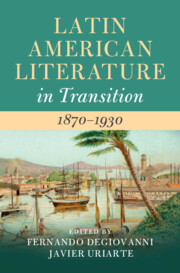Book contents
- Latin American Literature in Transition 1870–1930
- Latin American Literature in Transition
- Latin American Literature in Transition 1870–1930
- Copyright page
- Contents
- Figures
- Contributors
- Acknowledgments
- Introduction
- Part I Commodities
- Part II Networks
- Part III Uprisings
- Part IV Connectors
- Part V Cities
- Chapter 22 Iquique, Chile
- Chapter 23 Manaus, Brazil
- Chapter 24 San Juan, Puerto Rico
- Chapter 25 Ciudad Juárez-El Paso
- Index
- References
Chapter 25 - Ciudad Juárez-El Paso
from Part V - Cities
Published online by Cambridge University Press: 14 January 2023
- Latin American Literature in Transition 1870–1930
- Latin American Literature in Transition
- Latin American Literature in Transition 1870–1930
- Copyright page
- Contents
- Figures
- Contributors
- Acknowledgments
- Introduction
- Part I Commodities
- Part II Networks
- Part III Uprisings
- Part IV Connectors
- Part V Cities
- Chapter 22 Iquique, Chile
- Chapter 23 Manaus, Brazil
- Chapter 24 San Juan, Puerto Rico
- Chapter 25 Ciudad Juárez-El Paso
- Index
- References
Summary
Revolutionary developments along the El Paso and Ciudad Juárez border during the turn of the twentieth century created a cultural renaissance that resulted in scores of literary works, memoirs, films, and other artistic productions that rearticulated the experiences of living in a liminal border zone. This chapter explores serialized literature published by El Paso Spanish-language newspapers during the Mexican Revolution, including Tomóchic (1896) by Lauro Aguirre and Teresa Urrea, Los de abajo (1915) by Mariano Azuela, Memorias de mi viaje (1914) by Olga Beatriz Torres, The Wise Man of the Land of Moctezuma (ca. 1925) by Victor L. Ochoa, and the bilingual film by Félix and Edmundo Padilla, La Venganza de Pancho Villa (ca. 1930). I argue that the literature and film produced in these two cities along the international dividing line reveal the liminality of frontera itself produced much of the affective charge of fronterizo cultural productions.
Keywords
- Type
- Chapter
- Information
- Latin American Literature in Transition 1870–1930 , pp. 372 - 385Publisher: Cambridge University PressPrint publication year: 2022

